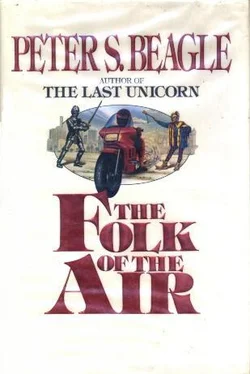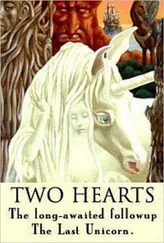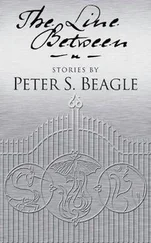He sat back loosely and grinned with freckled teeth. Farrell nodded, gazing straight away over the young man’s shoulder. My eyes get me into trouble. Look directly at this one and he’ll follow me forever, nagging me about loving all creatures great and small . But he said, “Inverness. Yeah, I’ve heard that’s good water around Inverness.”
“Go up there all the time,” the young man said. “Gilroy too. Gilroy’s not as good as Inverness, but it’s all right. And Arnold. There’s a little town called Arnold, they’ve got great water, better than Gilroy.” His eyes were dark blue, unnervingly tranquil and benign.
For the first time Farrell noticed the empty glass on the young man’s side of the table. He raised his eyebrows at it, but the other only smiled more candidly than ever. “I didn’t drink any water out of that. You look and you’ll see it’s dry. I just come here for the glasses.”
He looked warily to left and right; then, with a clumsy slapping motion, he swept the glass off the table. Farrell heard it break, not on asphalt but on other glass. He glanced down to see a wrinkled paper shopping bag squatting openmouthed by the young man’s foot. In the sunlight the gleaming curved fragments were heaped as close and as brightly as snow. The young man said, “See, I eat glass. I’ll eat all the glass there in two days, maybe three days.”
Two feet away from them, three children were haggling loudly over the price of a drug designed to sedate the larger carnivores. A white man and a black woman, both middleaged, strolled very slowly by, formally arm-in-arm, nodding slightly to acquaintances. Farrell saw them on Parnell every day, invariably dressed alike, whether in frayed suits of red velvet or in bib overalls faded to the color of nursing-home mattresses. He knew them to be direly poor and mad; and yet each afternoon at this time, the man’s pace and manner reclad him in the grandly perilous dignity of an iceberg, a rhinoceros, while the black woman carried herself as if she were the swaying, murmuring clapper of a bell of crinoline and taffeta. At the table just behind Farrell, several Iranian students were beginning to hit each other.
“This place has the worst water in Avicenna and the best kind of glass,” the young man said. “Funny, but that’s how it is. Real quality glass.”
Farrell cleared his throat. “You know, I really wouldn’t eat all that glass. I really don’t think you should.”
The young man said, “I been struck by lightning two times.” Farrell looked up and down Parnell, wishing with a sudden aching fierceness to see someone he knew coming along. “Once in the back, and once right in the back of the head,” the young man said. “Two times.” He was leaning across the table again, his meaty breath damp on Farrell’s cheek. “That’s why I eat glass. Good glass, colored glass a lot, like wine bottles. Desert glass, them old mason jars been out in the sun for years and years. I eat all that stuff.”
The mention of wine bottles reminded Farrell that it was Thursday, his usual day to pick up some small dinner present for Ben and Sia. He scraped his chair, mentally choreographing his flight to clear sidewalk: a buttonhook around the Iranians to cut between the regular Rastafarian debating society and two women playing Purcell’s Trumpet Voluntary on musical saws. Vaguely he thought that it might be useful to start wearing a hat or carrying something like a portfolio. You put it on the table when you sit down, and when you pick it up even the Ancient Mariner knows you have to go . He looked along Parnell once more, yearning angrily past the street merchants, the record shops and the tiny bead-curtained restaurants down to where the medical office complexes abruptly began. I’m lonely , he thought, this nut’s made me lonely. What a dumb thing .
The young man said against his face, “And when I’m all full of glass, right up full, and it’s all in my bloodstream and my bones and in my brain, and I go somewhere it’s dark, in a closet or somewhere, how I’ll shine! I’ll be like one of them pictures you make with little bits of colored stones, tiles, I don’t know what they call them—”
“Mosaic,” Farrell said automatically. Then Julie Tanikawa drove her motorcycle slowly past the South Forty, and Farrell got up and went after her without a word, bumping into tables.
Traffic was backed up for several blocks, as always on Parnell in the late afternoon, and the huge black BSA was barely moving at a walking pace. Farrell plowed into the street like a machine himself, bulldozer-blind and deaf to everything that was not Julie. On his way to her, he knocked a board covered with copper brooches out of the hands of a hobbitish young couple, caromed unaware off a pushcart selling hot soft pretzels, and charged straight through an incipient religious conversion. It never occurred to him to call her name.
The BSA was actually at a standstill when he reached it, Julie having braked for a covey of sign carriers who appeared to be picketing a speed bump. Farrell swung his leg over the bike, sat down behind her and put his hands lightly on her waist. “Akiko Tanikawa,” he said in the whining beggar’s voice of a Kabuki demon. “You wear short dresses and do not go to the ritual baths. You have broken faith with the eight million gods of Shinto. The footless dead will come to you when the grasses sleep and bitch in your ear.”
Julie gasped softly and went momentarily rigid, but the traffic was moving again, forcing her to drive on without turning. Out of the side of her mouth she said, “Farrell, if that isn’t you, you are in very deep trouble.” The motorcycle jolted forward, nearly scooting out from under Farrell, who yelped as the tailpipe singed his ankle.
“Does this bus go to Inverness?” he asked. “I need a glass of water.” Julie hit the brakes again, for no apparent reason, and Farrell’s nose smacked hard against the back of her helmet.
She said, “This bus is off-duty, the driver carries only five dollars in change, and the first free moment I get I’m going to pound you into an omelette, Farrell. Jesus Christ, you don’t just do that to someone, who the hell do you think you are?”
“Your old college sweetie,” he answered meekly. “Who hasn’t even known where you were for three years.” Julie snorted, but the motorcycle accelerated a bit more smoothly, slipping past a low-rider convertible which was blocking traffic like a mauve kidney stone. Farrell said, “Who was so glad to see you that he got a little, as you might say, transported.” He paused, and then added, “As someone was pretty damn transported to see him one time. In Lima, was it?”
Julie made a sharp and very sudden right turn, canting the BSA almost onto its side, like a racer, and gunning it uphill for two blocks as Farrell shut his eyes and clutched her. Handling the great machine as deftly as a feather duster, she whisked it to the curb in front of a fraternity house and cut the engine, pulling off her helmet as she turned toward him. “In Lima,” she said quietly. “In the market.” Farrell dismounted to let her haul the BSA up on its stand, and they stood the bike’s length apart, wary and uncomfortable, staring at each other. He saw that she had let her black hair grow below her shoulders again, the way she wore it in college.
“I’m sorry,” he said. “I was just grateful, you don’t know.” Julie studied him a moment longer; then blinked, shrugged, smiled like water breaking in the moonlight, and lunged silently into his arms. She almost knocked him off his feet—Julie was a strong woman and quite as tall as Farrell—and that was entirely proper, that was the only tradition they had ever had time to establish, unless you counted their habit of meeting one another in strange places, always unprepared. Farrell had thought often in the last ten years—though never when he was with her—that, of all the generous things that had happened to him with women, those first thundering embraces from Julie Tanikawa, after a suitable separation, were about the best. Taking everything into consideration, like the fact that we can’t stand each other longer than three days .
Читать дальше












